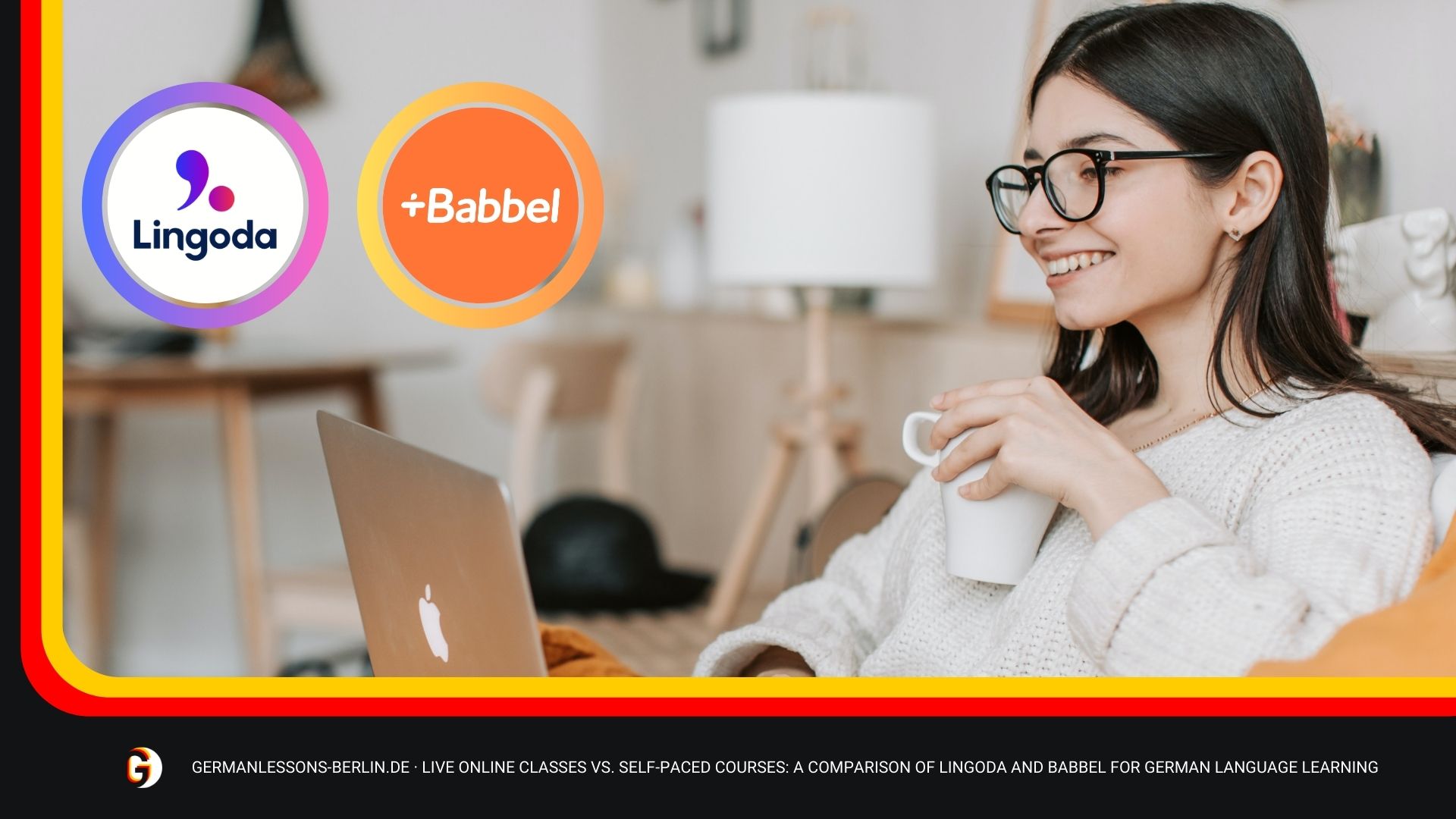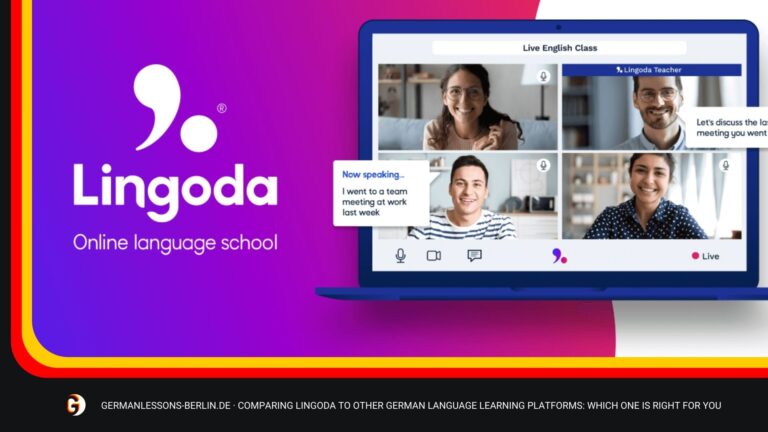Are you considering taking a course to learn German? Do you want the convenience of an online class, but are also looking for something self-paced? Then Lingoda and Babbel could be perfect for you. In this article, we’ll compare their live online classes with their self-paced courses, so that you can decide which one is right for your needs.
Learning a language can be difficult, especially if it’s not your native tongue. But with the help of modern technology, it has never been easier to pick up new skills like learning how to speak German. There are two popular programs out there: Lingoda and Babbel. Both offer great options for those wanting to study German from home.
Lingoda provides both live online classes and self-paced lessons that can help anyone get started on their journey to becoming fluent in the language. They have experienced teachers available who are able to give tailored instruction depending on what level each student is at. Meanwhile, Babbel offers its own version of virtual classrooms as well as prerecorded material that allows students to go through the materials at their own pace without having to worry about keeping up with others or missing important parts of the lesson due to technical difficulties or other issues. So let’s dive into these two platforms and see how they measure up when it comes to teaching German!
Table of Contents
Overview Of Learning Platforms
Learning online is becoming increasingly popular as technology advances and more people looking to develop their skills remotely. There are now many different online learning platforms available, including language learning platforms that offer courses in various languages. Lingoda and Babbel are two of the most popular options for German language learners who want to access quality instruction from the comfort of their own homes.
Lingoda provides a variety of online classes with experienced teachers from around the world. Learners can choose between live group classes or one-to-one sessions to improve their skills and gain confidence in speaking German. The platform also offers an extensive library of self-paced materials, so users can study at their own pace and practice whenever it suits them best.
Babbel has a range of high-quality online courses designed specifically for German learners. All lessons use modern teaching methods such as video conferencing and interactive activities to keep students engaged throughout each session. Students can take part in live classes where they can engage with other participants, or opt for private tuition if they prefer more personalized instruction. Both approaches provide plenty of opportunities to learn new vocabulary, increase understanding of grammar rules, and practice real conversations in German.
These two language learning platforms both offer comprehensive solutions for those wanting to start studying or brush up on their existing knowledge of the German language. With flexible course times and experienced instructors, these platforms make it easy for anyone wishing to expand their linguistic horizons without having to leave home.
Advantages Of Live Online Classes
A live online class offers a unique approach to language learning that is not available in self-paced courses. With interactive lessons, real-time teacher feedback, and the ability to connect with other students virtually, it’s no wonder why many people opt for live classes over traditional study methods. Lingoda and Babbel both offer various advantages of live classes:
- Personalized Learning – Live classes provide a personalized learning experience where teachers can tailor their instruction based on each student’s individual strengths and weaknesses. This allows learners to get more out of their lessons as they focus on areas they need extra help in a while also honing skills they already have mastery over.
- Engaging Lessons – In virtual classrooms, teachers use engaging activities like games, quizzes, discussions, and group projects to keep learners engaged throughout the lesson. This makes studying enjoyable rather than tedious, which helps improve retention rates and overall satisfaction levels among participants.
- Interactive Experiences – With a live instructor present, there are plenty of opportunities for meaningful interactions between teacher and student as well as amongst peers in the class. This creates an immersive environment similar to being in a physical classroom which encourages active participation from all parties involved.
Live online classes undoubtedly provide numerous benefits when compared to self-paced courses such as those offered by Lingoda or Babbel. With personalized instruction, engaging activities, and interactive experiences, students can gain invaluable knowledge without sacrificing quality or convenience – making them an ideal choice for anyone looking to sharpen their German language skills!
Disadvantages Of Live Online Classes
One of the key differences between live online classes and self-paced courses is that with a virtual class, there are certain drawbacks that may affect learning outcomes. These include scheduling conflicts, lack of flexibility in terms of course progress, and difficulty in establishing relationships with peers. To better understand these disadvantages, let’s look at their impact on language learning through two popular providers: Lingoda and Babbel for German language study.
| Advantages | Lingoda | Babbel |
| Scheduling Conflicts | Limited availability | Flexible Schedule |
| Flexibility | Rigid Course Progress | Customizable Content |
| Peer Relationships | Difficult to Establish | Opportunities to Connect With Peers via Discussion Boards/Forums |
Scheduling conflicts can be particularly problematic when it comes to live online classes offered by Lingoda, as they only offer limited availability of slots throughout the week compared to Babbel where students have more flexible schedules. Furthermore, due to the rigidity in how each lesson progresses during a Lingoda session, many students find themselves unable to keep up or take breaks if needed while taking classes here whereas when using Babbel they can customize the content according to their own pace and needs as well as re-evaluating previously completed materials. Lastly, due to the fast-paced nature of virtual sessions, forming relationships with other learners can be difficult however opportunities exist within discussion boards and forums for those who choose Babbel over Lingoda.
Therefore, whilst live online classes have their advantages such as real-time feedback from tutors and native speakers; potential downsides like scheduling issues and difficulties in connecting with others should not be overlooked when weighing up options for language learning. For those looking for an immersive experience without compromising convenience then self-paced courses may just prove beneficial after all.
Advantages Of Self-Paced Courses
Moving on from the disadvantages of live online classes, let’s take a look at the advantages of self-paced courses. Self-paced learning offers time flexibility which allows learners to manage their own schedule and study when it suits them best. This is ideal for those who have busy lives or other commitments such as work or family obligations that they need to juggle with language learning.
Customized learning is another benefit of self-paced courses; learners can tailor their course content to suit their individual needs and goals. With Lingoda and Babbel, this means you get to choose what kind of lessons you want to focus on so that your learning experience is truly tailored to your personal preferences. You are also able to go back over any topics you find difficult until you feel confident in each area before moving on to something new.
One further advantage of self-paced courses like Lingoda and Babbel is access to individual support. As these platforms offer both group and 1:1 sessions with native-speaking teachers, students can ask specific questions about grammar or pronunciation if needed during the lesson. Additionally, all assignments completed by the student will be marked by an experienced teacher who will provide constructive feedback on how well they are progressing toward achieving their desired level in German.
Self-paced courses also have a clear structure where tasks are broken down into manageable chunks so that learners don’t become overwhelmed with too much information being presented at once. This makes understanding complex concepts easier without compromising on the quality or depth of knowledge gained during the process. Furthermore, having smaller tasks helps build confidence whilst encouraging participation throughout the entire course duration – ultimately leading to improved results in language proficiency tests such as Goethe Zertifikat A2/B1 exams.
In summary, then, there are many benefits associated with taking self-paced courses such as Lingoda and Babbel for German language learning compared with live online classes including greater time flexibility, customized learning experiences based on individual needs, access to individual support from experienced teachers, and a structured approach which encourages progress along the way.
Disadvantages Of Self-Paced Courses
Self-paced courses have some disadvantages that can be difficult to overcome. These include:
- Lack of interaction: When studying alone, there is no live teacher or a group of peers with whom you may interact and ask questions. This means the learning process could become very stagnant as one progresses through the course material.
- Limited Feedback: Without an instructor monitoring progress, it could be difficult for a student to know if they are making any genuine headway in their language studies without outside assistance from experts.
- No guidance: Self-paced courses require students to understand and follow the curriculum themselves, which often requires additional research prior to starting a course. Without structured guidance provided by an experienced educator, learners might find it hard to make sense of their lessons.
- Lack of structure: Learning German through self-paced courses can be challenging because it involves creating study plans that are tailored around each individual’s needs and interests; this makes it harder for students to stay motivated throughout their classes as compared to those who attend live online sessions where teachers provide them with more direction and support during class time.
In short, while self-paced courses may offer flexibility and convenience, these advantages come at the cost of having limited access to interactive experiences, expert advice and feedback, quality instruction, and structured guidance – factors that are essential for successful language learning outcomes.
Pros And Cons Of Lingoda For German Language Learning
Now that we have discussed the disadvantages of self-paced courses, let’s explore what Lingoda offers for German language learning. Lingoda is an online language school offering live classes as well as self-paced courses in multiple languages. With a focus on German, they provide real-time classes with certified teachers from all over the world who can help guide you through the complexities of learning this difficult language.
When looking at the pros and cons of using Lingoda for your German language learning, one clear benefit is their emphasis on flexibility. You are able to choose between various lesson lengths, ranging from 30 minutes up to 90 minutes per class. This allows students to easily fit lessons into their busy schedules without feeling overwhelmed or rushed. Also, if you miss a class due to unexpected circumstances, there is no penalty; simply reschedule it within 24 hours and pick up where you left off!
Another advantage of Lingoda is its wide range of topics and levels available for study. Whether you’re just starting out and need basic grammar practice or already use conversational German but want more advanced conversation skills, there’s something here for everyone regardless of current knowledge level. As each course progresses, new material is presented in an engaging way which keeps things interesting while ensuring mastery of key concepts.
Finally, Lingoda provides comprehensive support services including dedicated customer service representatives ready to answer any questions or concerns related to studying with them. They also offer helpful tips and advice throughout each course so nothing gets overlooked during the process of learning a foreign language. All these features make Lingoda an ideal choice for anyone seeking quality instruction when it comes to mastering the German language.
Pros And Cons Of Babbel For German Language Learning
When it comes to learning German, Babbel is a popular choice. That said, there are pros and cons associated with this program that should be taken into account when making the decision to join. To make an informed decision, let’s take a closer look at what makes Babbel unique.
First of all, many people find the cost of Babbel quite reasonable compared to other online language-learning programs. This affordability has been noted in numerous Babbel reviews from users who have found success with their course materials. Additionally, students can choose between two different payment plans: monthly or quarterly – allowing them greater flexibility depending on their budget size and goals.
Another great feature of Babbel is its curriculum structure which provides learners with more than just grammar lessons; It also focuses heavily on practical conversational skills such as listening comprehension and pronunciation practice that will help improve fluency quickly. Furthermore, due to its comprehensive approach to teaching German, it allows for less repetition and keeps learners engaged throughout their studies.
The effectiveness of the program largely depends on how much effort students put into their lessons. However, some learners have reported limited progress after using Babbel despite putting time into studying each day – suggesting not every student may benefit equally from the program’s methods. That being said though, reaching out to customer support might provide helpful suggestions for improving results if you’re having any issues during your courses.
Overall then, while Babbel offers affordable prices and a structured curriculum designed to build confidence in speaking German, it’s important for potential learners to consider whether they would be able to commit enough time and effort required for successful completion before signing up for classes.
Cost Comparison
When it comes to the cost comparison between Lingoda and Babbel for German language learning, there are some distinct differences.
| Feature | Lingoda | Babbel |
| Price/Month* | €99 – 199** | €35-89*** |
| Money Back Guarantee?**** | Yes (14 days) | No |
| Classes per Month***** | 4-10 classes/month | |
| Payment Plan Options? | Yes | |
| Are discounts Available? | Yes (20% off 1st month) |
*Prices may vary depending on the subscription type selected. ** For Premium Plus plan users with unlimited access to all courses & tutoring sessions. ***For Personalized Tutoring plans only. Not applicable to self-paced course options. **** Refundable within 14 days of the purchase date for a full refund or partial credit towards another product from Lingoda’s catalog. ***** Number of classes available each month varies according to plan but must be used within 30 day period for which payment was made; unused class credits will expire after that time frame.
As you can see from this table, Lingoda offers more expensive pricing than Babbel, however, they also offer a money-back guarantee as well as discounts on their first-month subscription fee. Additionally, when compared side by side, the number of classes offered per month is much higher with Lingoda than it is with Babbel’s personalized tutoring package option. Finally, both companies provide customers with payment plan flexibility should their budget require it. All these factors make Lingoda an attractive option if the price isn’t the deciding factor for learners looking for quality German language instruction online.
Suitable Candidates For Each Program
What type of language learner is best suited to each program? Live online classes and self-paced courses are both effective ways of learning a new language, but the ideal candidate for each will vary.
For live online classes, an ideal candidate would be somebody who enjoys interacting with other learners, has good time management skills, and can commit to attending regularly scheduled sessions. Lingoda offers multiple levels of German language instruction that fit around different schedules and needs; whether you’re looking to participate in daily conversations or delve into more complex topics like literature and culture, there’s something for everyone. Moreover, they offer support from trained native instructors who can provide personalized guidance throughout the course.
On the other hand, those studying with Babbel might not need as much structure or interaction between students and teachers. Self-paced courses allow users to progress at their own speed without having to adhere to any particular schedule. A suitable candidate for this kind of program would be someone who is comfortable working independently on their own initiative while still receiving feedback from experienced tutors when needed. This makes it possible to learn at your own pace and focus on specific areas that you want to improve upon at your leisure.
In summary:
- Live online classes through Lingoda are best for learners who enjoy interacting with others, have a good sense of time management and commitment;
- Self-paced courses through Babbel are well-suited for independent learners willing to work at their own pace;
- Both programs offer excellent opportunities for language learning candidates regardless of level or experience.
Tips For Making A Decision
When it comes to language learning, making a decision between live online classes and self-paced courses can be tough. Here are some tips for helping you decide which option is best for you.
First, consider the cost comparison of each option. Lingoda provides both group and private lessons with prices ranging from around €20 per hour up to €50 depending on the type of lesson chosen. Babbel offers self-paced course packages at different price points starting as low as €19 per month if taking their Self Study package or up to €99 per month if enrolling in their Intensive Plus+ Package. Both Lingoda and Babbel have free trial periods so make sure to take advantage of them before committing to either one!
Second, think about what kind of learning environment suits you better: an interactive class or something more independent. If you prefer having someone guide your learning process, then live online classes may be the way to go. On the other hand, if you feel comfortable teaching yourself without additional help, then maybe a self-paced course would fit your needs better.
Thirdly, evaluate how much time you really have available for studying German every day or week. Live online classes usually require attending scheduled sessions at specific times whereas self-paced courses allow greater flexibility when it comes to scheduling study sessions that work within one’s availability. It’s important to ensure that whatever option chosen matches one’s lifestyle commitments in order not to fall behind on progress made towards reaching desired goals.
In short, making a decision between live online classes vs self-paced courses should depend largely on personal preferences such as budget constraints, preferred learning style, and availability of time dedicated to language studies. Evaluate all these factors carefully when deciding which route will best suit your individual needs in terms of achieving successful results while learning German!
Frequently Asked Questions
How Long Does It Typically Take To Learn German With Either Lingoda Or Babbel?
It’s a common question: how long does it typically take to learn German with either Lingoda or Babbel? To gain an understanding of the duration required for learning German, let’s compare these two language-learning platforms.
Lingoda is renowned for its excellent online teaching and fast results when it comes to learning German. For those who prefer live classes, they offer group sessions led by experienced tutors as well as one-on-one lessons with certified teachers. As far as their self-paced courses are concerned, learners can choose from a variety of topics such as vocabulary building and grammar exercises. Regarding the duration needed to learn German with Lingoda, students should expect to commit at least 10 hours per week in order to make progress within 6 months. Here are some tips that will help you reach your goal faster:
– Utilize resources like flashcards and audio files outside of class
– Participate actively during live classes
– Aim for consistent practice rather than cramming
– Set realistic goals each week
On the other hand, Babbel offers more flexible options when it comes to learning German. Their self-paced courses include video lessons that cover key aspects of the language such as pronunciation, conversation skills, and grammar rules. Additionally, there are quizzes available so learners can test themselves on what they have learned in each lesson. Generally speaking, completing all the necessary steps in Babbel’s self-paced course requires about 8 weeks if students dedicate 5 hours per week – but this could vary depending on individual aptitude and dedication towards studying regularly. Some suggested approaches while using Babbel include:
– Regularly review materials after completion
– Practice conversations with native speakers through their app
– Take notes throughout the course
– Make use of memory techniques such as mnemonics
Ultimately, both Lingoda and Babbel have advantages when it comes to learning German quickly; however, which platform works best depends largely on personal preference and availability of time each day/week for study purposes. If someone has access to additional resources like textbooks or audio files outside class then Lingoda may be ideal since it offers regular feedback from qualified instructors along with guidance for successful outcomes. Otherwise, Babbel provides an effective way to build a strong foundation in German without having to wait around for scheduled classes or paying extra fees for private tutoring sessions.
How Much Time Per Day Should Be Devoted To Learning German With Either Lingoda Or Babbel?
Deciding how much time to devote to German language learning is an important step for anyone seeking fluency. Whether you choose Lingoda or Babbel, both platforms offer great instruction and lessons that can be customized to fit your schedule. However, it’s necessary to consider the amount of time per day that should be devoted in order to maximize results.
The amount of time required will depend on a few different factors, such as the student’s current level of proficiency in German and their individual goals. Generally speaking, those who are just starting out with either platform may need more daily practice than someone who already has some experience with the language. For example, beginners might spend several hours each day practicing basic grammar and vocabulary while more advanced learners could focus on increasing comprehension through lectures or conversations.
Time management is key when utilizing either Lingoda or Babbel for German language learning. Setting aside dedicated blocks of time throughout the week can help ensure regular progress throughout the course. Additionally, having specific goals in mind can also make scheduling easier since students know exactly what they want to accomplish by a certain date. It’s best to start small – devoting around 30 minutes every day – and then gradually increase that number over time as confidence builds up and new skills become second nature.
No matter which platform you choose for German learning purposes, dedicating enough time on a consistent basis is essential for success. By carving out focused periods during each day, building discipline becomes easier, and mastering the language faster too! Knowing where and how to invest your energy will go a long way toward reaching any desired goal in this area so take the initiative now and begin planning accordingly!
What Are The Prerequisites To Using Either Lingoda Or Babbel For German Language Learning?
When it comes to learning German, there are prerequisites that must be met in order for the learning process to go smoothly. Whether one opts for a live online class or self-paced course with Lingoda or Babbel, understanding these language learning prerequisites is an essential part of getting started. In this article, we will discuss what those German language prerequisites are and how they differ between both platforms.
First, let’s take a look at what Lingoda requires of its users in terms of prerequisite knowledge. This platform offers three levels: basic (A1), intermediate (A2), and advanced (B1). For each level, students should have some familiarity with key grammar concepts such as verb conjugation, noun cases, and pronunciation. Additionally, Lingoda expects their learners to have attained certain levels of proficiency when using colloquial expressions or reading comprehension skills before moving on to the next stage.
On the other hand, Babbel has different requirements depending on which type of course you choose. If opting for the intensive program then prior knowledge in grammar and vocabulary is expected; however if taking up the more relaxed approach like participating in conversation classes then no prior experience is necessary. Regardless of which option one chooses, it’s important to note that mastering all four core areas – listening/speaking/reading/writing – is paramount to successful German language learning regardless of whether you use Lingoda or Babbel.
In addition to having some baseline understanding of grammar rules and conversational phrases, potential learners should also factor in any external factors that may affect their studies such as lack of motivation or time constraints due to work commitments, etc… Before signing up for either service provider it would be wise to assess your personal goals and expectations so that you can make sure that whichever platform you pick meets your needs best.
For prospective learners embarking on a journey towards gaining fluency in German by way of lingua franca courses offered by Lingoda or Babbel, meeting the specified language learning prerequisites provides them with a good foundation from which they can build during their lessons.
What Additional Resources Are Available To Supplement Learning With Either Lingoda Or Babbel?
When it comes to learning German, there are several options available. Two of the most popular resources for language learners are Lingoda and Babbel. But what additional resources can be used to supplement their courses? This article will explore the various materials each platform offers in order to enhance your experience with either Lingoda-resources or Babbel-resources.
Lingoda provides access to online tutoring services as well as a range of language exercises that can help you improve your skills quickly and effectively. Their library includes flashcards, audio files, grammar lessons, and quizzes – all designed to give students an immersive understanding of the language from native speakers. In addition, they offer interactive webinars so users can practice speaking with other learners in real-time.
Babbel also has a variety of tools and activities for those looking to learn German. They provide both self-guided courses and live classes taught by experienced instructors who have worked in Germany or Austria before. The courses cover topics such as sentence structure, pronunciation tips, listening comprehension exercises, and vocabulary-building games. Additionally, users have access to digital worksheets which contain fill-in-the-blank sentences as well as multiple-choice questions which help reinforce key concepts being discussed in class.
Both Lingoda and Babbel provide plenty of opportunities for students looking to build their knowledge base in German through engaging material while also having fun along the way! By taking advantage of these german-learning platforms’ comprehensive libraries and utilizing their helpful online tutors – users can get ahead faster than ever before on their journey toward fluency. With this combination of support systems at hand plus a little bit of dedication – anyone is capable of mastering German regardless of where they may find themselves starting out!
Are There Any Discounts For Long-Term Subscriptions For Either Lingoda Or Babbel?
Are there any discounts for long-term subscriptions for either Lingoda or Babbel? This is an important question to consider before committing to a language learning service. Discounts can be the difference between whether you invest in a short-term subscription or commit to a longer period of time with potentially great savings. So, what do Lingoda and Babbel offer in terms of discounts on their long-term subscriptions?
Lingoda offers discounted prices when signing up for its six-month Plus membership which includes unlimited access to all courses offered by the platform. With this plan, users pay only €299 instead of the regular price of €499 – that’s 40% savings! In addition, if users decide they need more than 6 months, they also have the option of getting 12 months at a 15% discount (€899).
Meanwhile, Babbel has several different pricing plans available depending on how many classes are taken per week. For example, their monthly package allows students to take four lessons each month for €24.90 but does not include any additional benefits such as access to course materials or one-on-one conversations with tutors. However, those who sign up for their annual subscription will get a 25% discount off the monthly rate plus other perks like extra practice sessions and personalized feedback from instructors.
When it comes to finding discounts on long-term subscriptions for language learning services like Lingoda and Babbel, both platforms provide attractive options for potential customers. While Lingoda’s six and twelve-month packages offer significant cost savings upfront, Babbel’s annual plan may work better if you’re looking for additional features and support beyond just taking classes. Ultimately, it boils down to deciding which plan best fits your needs and budget while expecting quality results with either choice.
Conclusion
In conclusion, there is no single answer to the question of which language-learning platform is best for German learners. Depending on an individual’s goals and budget, either Lingoda or Babbel could be a great choice. Both platforms offer live online classes as well as self-paced courses; however, each has its own benefits in terms of how long it typically takes to learn German, along with the amount of time that needs to be devoted per day and any additional resources available.
For those wanting to save money, both Lingoda and Babbel offer discounts for long-term subscriptions. Therefore, it’s important to consider such factors when deciding between the two options so you can find the best one suited for your specific needs. It’s also beneficial to look at what prerequisites are required since this may play a role in determining which platform will work best for you.
Overall, whether you choose Lingoda or Babbel for German language learning comes down to personal preference and taking into account all the details associated with each option before making a decision. With either one, I’m sure you’ll have success in mastering the German language!








